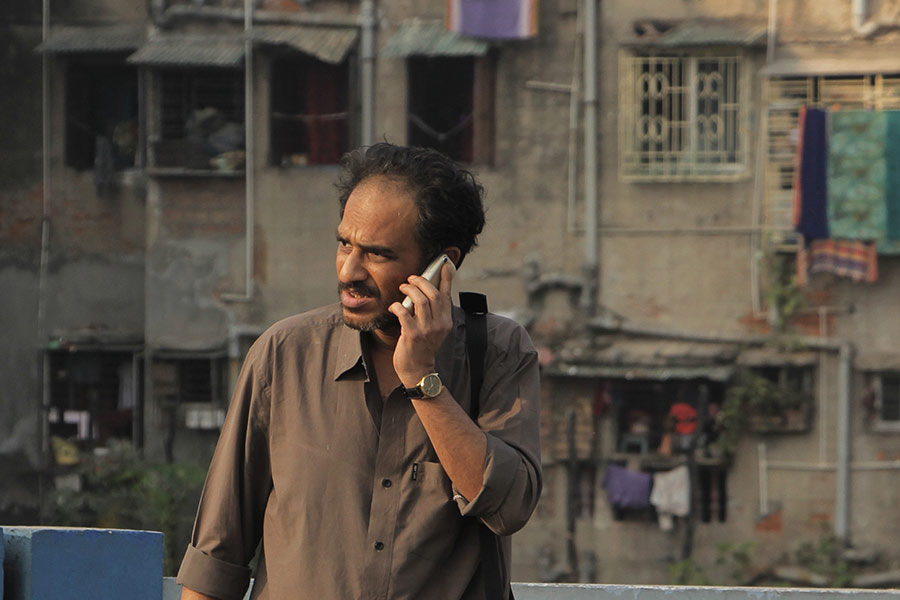The mobile phone pings. The man, sitting in a fancy mall, looks at it. It’s a message from a leading bank in India, wishing him on his birthday, telling him how the bank values its relationship with him. I couldn’t help smiling wryly at the irony of it. The man does not have a rupee to his name. He is a henchman for a corrupt political fixer, has just served a short sentence for petty theft, and is being drawn into another illegal scheme involving his sex worker girlfriend. Indranil Roy Chowdhury’s Mayar Jonjal abounds in sequences like this, painting a heart-breaking kaleidoscope of a metropolis ‘less shining’.
The director whose debut film Phoring (2013) was a critical and box-office success says, “I choose to tell stories that I am experiencing myself as an individual.” Mayar Jonjal seamlessly weaves together two short stories by Manik Bandopadhyay — Bishakto Prem and Subala. Though Manik Bandopadhyay’s stories are set in 1952-53, the film unfolds against the backdrop of contemporary Kolkata. It is to the credit of the writers and the director – and of course the timelessness of the original works – that the film feels so relevant in its concerns and the world it evokes even 70 years later.
“We wanted to make a short film based on Manik Bandopadhyay’s Bishakto Prem. After we wrote the script, we felt something was missing. We decided to take another story to understand how they gelled with each other. My co-writer Sugata Singha suggested the story Subala. There is no similarity between Manik Bandopadhyay’s story and the film except the mental state of the characters. The stories are just a reference point. The world they evoke is important,” says Indranil.
Manik Bandopadhyay’s stories reflect the darkness of today’s world
By the time Manik Bandopadhyay died at the young age of 48, he had authored over 30 novels and 200 stories. One of the first of Bengal’s literary giants to bring to life the marginalised and the oppressed, he ushered in a new style of prose. Though their literary merits are undeniable, unlike many of his contemporaries and those who followed, not many of his stories have been adapted into films because of the complex and often grim world they dealt with.
The ones that have made it include Dibaratrir Kabyo (which fetched Madhabi Mukherjee a National Award for best actress), Nabyendu Chatterjee’s Shilpi and Sarisreep (one of Dhritiman Chaterji’s finest performances in a film that is shockingly brutal), Mrinal Sen’s Calcutta ’71, and Goutam Ghose’s Padma Nadir Majhi. The director says, “We were trying to portray the world we live in. Manik Bandopadhyay’s stories reflect the darkness and divisiveness of today’s world. This is something most contemporary writers don’t have.”
In Mayar Jonjal, Satya (Shohel Mondol) is a petty criminal in love with Beauty (Chandreyee Ghosh), a sex worker sold into the trade by her husband. Chandan (Ritwick Chakraborty) works as a guard at an ATM after having lost his job at a department store. Much to his consternation, his wife Soma (Aupee Karim), keen to ensure that their son’s education does not suffer, enlists herself as a full-time house help with a rich family in a fancy multi-storey condominium.
The narrative weaves together these disparate lives and circumstances seamlessly, so that it never seems like these are two separate stories. Consider, for example, the sequence of the sex worker (in the story Bishakto Prem) and Soma’s employer (from Subala) both visiting the same salon for a facial. Or how Satya’s betrayal of Beauty is aided by Chandan getting embroiled in a drug business. The writing is strong and consistently brings out the contrast between the worlds the characters inhabit without underlining it.
The underbelly and violence that runs as a subterranean stream
These are the lowlifes of the city and Indranil and his cinematographer capture its underbelly very well. A remarkable aspect of Mayar Jonjal is the preponderance of long shots. With a narrative that highlights the mental states of the characters, it must have been tempting to get close-ups of the actors, more so given how brilliant almost each one is.
“It was a conscious decision,” says Indranil. “We decided to go more with long and establishing shots. Not intervene. Instead, we wanted the audience to watch things from afar. We consciously created a style which was not in your face and tried to tell it dispassionately. Naturally, the shot-taking had to be different. The film hardly has any close-ups.”
Another facet the director handles very well is the violence that runs as a subterranean stream. There is no overt act of violence but one can never quite shrug away the undercurrents. Take, for example, the sequence in a bar where a crooner sings Tagore’s ‘Tomar holo shuru’, while a gang of lowlifes talk nonchalantly about drugging and raping a woman. The contrast between the song and the conversation between them could not have been more pronounced, and it is this violence, emerging casually from everyday reality, that makes it potent. The scene does not exist in isolation. We know that Beauty came to the flesh trade in a similar way, and as the narrative nears the end we realise that that is where the film’s climactic tragedy originated.
Sensitive writing and an array of fine performances
That Mayar Jonjal’s inherent bleakness, the underpinnings of violence and the lack of close-ups do not in any manner come in the way of the film delivering an emotional sucker punch is largely due to the sensitive writing and an array of fine performances. Consider Beauty’s affable customer Ganesh babu (Bratya Basu), a moneyed wholesale dealer in fish. Ganesh had once aspired to be a classical singer and even ran away to Benares in search of a guru but eventually returned to the family business.
Ganesh finds a kindred spirit in Beauty and shares his frustrations and dreams with her. She is sympathetic and yet wily enough to negotiate a flat for herself. He brings her king prawns, which she cooks specially for Satya’s birthday. Satya gets her favourite paan for her but when he arrives, she is servicing a customer. Another girl serves him the food Beauty has cooked. He nibbles at the food, even as he can hear Beauty and the customer having sex in the next room. It is all delivered with an understated grace that hints at the relationships at play.
Some of the most lovingly written passages in Mayar Jonjal are centred around the avuncular relationship that develops between Soma and the ailing patriarch of the family she works for (superbly played by Paran Bandopadhyay). Initially against having her attend to his needs, hovering around and even sleeping in the same room (because, as he says, he won’t have the one freedom every old man should have – the liberty to fart), she becomes a close confidante as her optimism in the face of odds touches him.
In a characteristically quiet sequence, he muses about his inability to tell the good from the bad anymore and mentions an international scientist who is wary of what the human race is doing to the earth. She turns around and asks him, “Where do you find such people?” He smiles indulgently. “It’s Stephen Hawking,” he says. She is unimpressed. “Do not indulge people like these – ora baaje lok,” she says disarmingly. It can’t but bring a smile to your lips.

Ritwick Chakraborty in Mayar Jonjal
Ritwick Chakraborty nails it, and the others are equally good
The performances go a long way in giving Mayar Jonjal its vitality. Ritwick, of course, nails it. Is there any other actor in the industry who can bring so much to a scene which has him only look at his son having a plate of biryani? He holds a cup of tea in his hand, his lips are parted ever so slightly and the look on his face – the joy of being able to indulge his son, the fear of failing him – is alone worth investing in the film’s runtime.
The others are equally good. Chandreyee Ghosh has what is probably her best role to date, and boy does she deliver. There’s not a false note to her. Shohel is rock solid, while Aupee Karim is the film’s surprise package in a performance that is movingly eloquent even when she is not saying anything at all.
Talking about the casting, Indranil says, “Since it is an Indo-Bangladesh production, we had to cast from both the places. Aupee Karim is a well-known actor in Bangladesh. After I met her, we had long conversations and that is when I decided that she was the perfect choice for the character. Chandreyee was always on our mind even when we were preparing for the short film. It is difficult to portray this kind of a character convincingly. Once the script was done, we realised that Ritwick Chakraborty would be ideal as Chandan. We thought of casting Bratya Basu in a character that was different from what he normally plays on screen.”
Mayar Jonjal is not a feel-good film. It is not a film you can say you enjoyed. It is a film that stays with you after you have left the theatre. These are lives that are going nowhere. And not surprisingly, the film does not bother to tie up loose ends and refrains from providing a tidy resolution. The director says, “It was definitely a conscious decision. I wanted to create a certain level of disruption. The story has also been told in a disruptive way. These characters are doomed from the outset. There are no neat resolutions in life either. If I had ended the film on a different note, it would have been dishonest to the main grain of the story. I know a certain section of the audience had a problem with the ending because they are used to seeing films which have a closure.”
Shantanu Ray Chaudhuri is a film and music buff, editor, publisher, film critic and writer. The article was written with Soujannya Das.










